tl;dr: I started CBT for perfectionism last year. Here I share examples of the exercises I did so you can see the process. Ultimately, I think this process was helpful for reducing anxiety, procrastination, and poor prioritization stemming from unrealistic expectations around what I should be accomplishing. Resources are included at the end if this resonates with you.
This post is crossposted from my blog.
Luisa Rodriguez’s Imposter Syndrome post hit me hard when I read it last year.
I’d inadvertently adopted a mindset that you had to be one of the best people in the world to have an impact. Anything less would meet with failure and harsh judgment.
Unsurprisingly, this was bad for both my mental health and my productivity. I’d go through periods of feeling quite pessimistic that my work was valuable or that I could do really challenging, high-impact work. Often I’d feel that my coaching was mediocre because I wasn’t clearly transforming all my clients’ lives, despite generally good reviews and a full client load.
From the inside, perfectionism didn’t feel like striving for perfection or something silly like that.(1) Perfectionism felt like struggling (and failing) to meet perfectly reasonable standards that other people were somehow meeting. Then, of course, I felt bad about the failures and resolved to try harder….you can probably see the pattern here. It never felt obvious from the inside that my standards were unrealistic -- maybe my standards were a little bit high, but not unreasonable.(2)
For example, I sometimes found that I spent too long on projects because I was afraid of seeming incompetent. I’d hoped to get one of my side projects (the interview series) out the door in 2-3 calendar months, and it ended up taking nearly six.
That extra time cost me. I could have created an entire second project. Instead, I spent a lot of time polishing some supplemental materials that almost no one read.
I wanted to do a deeper career exploration last fall, including exploring some bigger ideas that I didn’t know if I could succeed at. I felt scared just thinking about the ideas, and terrified at the thought of telling others I was attempting them. What if I tried and failed? Or just decided it wasn’t worth it after all? Would they write me off as a failure or someone not worth working with in the future?
Those fears were my wake up call. I couldn’t really explore career options if just thinking about them felt scary. So I scheduled some sessions with a cognitive behavioral therapy (CBT) therapist and started Overcoming Perfectionism by Roz Shafran (a CBT workbook). I found both of these helpful for relaxing some of my implicit beliefs that were sabotaging my work.
I’m sharing some of my exercises from the process below, to hopefully make this more accessible for other EAs who might find a similar process helpful.
All the usual caveats: I’m not a mental health professional. This was my experience, yours may vary.
Perfectionism diagram
In the first or second session, the therapist walked me through a perfectionism model on the call. We laid out a bunch of the implicit thoughts I was experiencing.
I got the impression my therapist wouldn’t have said I meet the criteria for clinical perfectionism (e.g. I already could offer counters to many of the implicit thoughts), but the framework was still helpful for connecting some of my implicit assumptions (“I’m being harshly judged with little room for forgiveness”) with the actions I’d identified as counterproductive (“I have to keep working until this unimportant post is flawless”).
In particular, this exploration helped identify which “beliefs” felt true, even if I didn’t necessarily endorse them.
CBT Log – exploring the issue
My homework for several weeks was to fill in a CBT log each time I noticed myself feeling anxious, avoiding a task, or noticing relevant thoughts. This was super helpful for getting a more detailed picture of the situations and thoughts that triggered perfectionist behavior. It also helped me separate thoughts and feelings more reliably. (Perfectionist behavior for me includes anxiety, procrastination, and poor prioritization).
I set a reminder in my daily todo list to fill in the CBT log, which helped me remember to regularly go back to it.
A few example entries:
Identifying specific beliefs/patterns from the log
After I’d kept the original log for a few weeks, I looked over it and identified themes that came up repeatedly in my thoughts. For me, common themes included: my peers were harshly evaluating me and my work, feeling pessimistic about my work meant it was bad/wasn’t going well, trying something and then stopping was failing, not currently doing the most important thing was failing, and not gritting though lots of effortful work meant I would fail.
We discussed these themes in therapy sessions, plus I did some exercises on them (see behavioral experiments and pros/cons sections).
I already rationally knew that some of them were silly, but I needed this exercise to remind me over and over until I started remembering on my own. (E.g. trying an experiment and deciding it wasn’t worth continuing was a learning success, not a failure. I just had to remind myself that this was an experiment with the goal of learning, and it’s still a success if I learn it’s not worth doing more of.)
Some of the other worried I don’t think were completely unfounded, just exaggerated. For these, it helped to carefully evaluate the evidence for how severe and likely the risk actually was. (E.g. my peers do hold high standards for writing, but they’re probably not going to write me off after one bad post and a lot of writing success is hits-based. It’s fine if not every post is great.)
I incorporated the reframes into my CBT log, and practiced evaluating each situation through those perspectives. I added notes on the reframes I was practicing to the “behavior” column to remind myself to check those.
A few examples from this period in the log:
Pros and cons of perfectionism
One exercise the therapist suggested early on was to create a “pros and cons of perfectionism” list. This felt a lot like a short internal double crux exercise, where I listed the best cases for and against the standard next to each other, and I could consider evidence for both perspectives.
A few examples:
Behavioral experiments
I did behavioral experiments based on the template outlined in Overcoming Perfectionism. These were basically me just doing the thing that felt anxious or prompted perfectionistic tendencies, and evaluating the evidence I got.
I’m noticing that I’m feeling nervous about sharing the following example: “Ah, what if a future employer reads this, and thinks I’m not up for doing whatever job they otherwise thought I was a good fit for?” I want to add lots of caveats about, “But I can do more now with the ADHD medication!” Honestly though, I think it’s good to share this vulnerable experience of working through my feelings about something I wasn’t sure if I could do or not, in order to get to a place where I could accept that uncertainty and put myself out there.
Example: Applying to things
1. Belief:
If I apply to things, I’ll be rejected, judged harshly, and waste other peoples’ time, while also feeling incredibly anxious, wasting my time, and risking suffering depressive episodes afterwards. If I am accepted, it will be because I somehow falsely convinced them I was more competent than I am, and I’ll ultimately fail, be judged even more harshly, feel worse about myself, and be in a more precarious work situation going forward.
2. Identify the prediction in general:
If I apply to X job, 99% chance I’ll be rejected. So, I am probably wasting a few hours of my time and 15 minutes of theirs by applying. (Though I do get a small amount of information from whether I get to the first round or not, plus a very small probability of being surprised by their evaluation if I make it through multiple rounds. So not completely wasted time.)
I did feel incredibly anxious applying (tears were involved), and days later still feel mildly anxious thinking about someone reading my application. (100%)
Maybe 10% chance it will make the people evaluating my application think less of me than their baseline evaluation from knowing my name in the community? No, I think that’s wrong. Like, what I ended up writing shouldn’t make people downgrade their evaluation, unless their evaluation was incredibly uncalibrated and somewhat optimistic. Eh, we’ll go with 5% that I’ll be judged, but no way to evaluate this directly in my case (most likely) and it’s a black box of uncertainty. A survey on how often people thought less of someone after seeing what they’ve accomplished might help. (Ask Rohin)
I ballpark a 70% chance I could support the level of work required to do a normal 9-5 job. There might be ways to work around this in the role, and I’m upfront with my medical issues going in. But I think there’s a legitimate chance I’d be stressed and unable to keep up with demands. This prediction has high uncertainty and would need to be tested by doing a regular job – but I’ll note that doing the three-day 80k work trial exhausted me (it’s possible but not definite that I could keep that pace up).
I would need to stop doing the coaching, so I would be slightly worse off if I took the job and then needed to switch back. This is an overcomeable risk.
3. Specify the prediction precisely (specify behaviors and rate intensity of beliefs and emotions):
90% I don’t make it to the first round (of interviews/work trials).
99% I don’t get the job.
80% I feel “slightly” anxious about the application a week after submitting it. (I won’t feel super bad or have it actively bothering me, but it will feel aversive when I think of it.)
20% Rohin will say seeing work/resume makes him downgrade his opinion of people often, 40% he’ll think that others often do. (Insufficiently specified)
4. Experiment:
Apply.
Survey Rohin.
5. Results:
Rohin says he has a low prior on candidates so doesn’t often negatively update (which I’d anticipated), but also he doesn’t positively update much because he’s mostly doing a very basic filtering criteria on resumes and relies more on interviews. He doesn’t know how others approach applications.
I made it to the first round of work tests.
One week later, I still feel mildly aversive about the job. I don't feel anxious (which I had predicted), but I feel like I don't want the job and feel mildly aversive about doing the tasks.
I didn't make it to the second round of work tests.
6. Reflection:
After filling in this, it feels good that I applied to something that felt out of my comfort zone, and I don't feel anxious that I'm being judged for applying.
7. Revised belief:
If I apply to something, I'll likely be rejected, feel somewhat anxious, and ultimately not have anything to show for the time. But I probably won't be judged harshly or suffer depressive episodes afterwards, and I have a chance at getting good opportunities.
Wrapping up therapy doc
After a few months working together, I felt more in control of my perfectionism behavior. So we decided to pause therapy. In our last session, we filled in a “wrapping up therapy” template that included prompts for my key unhelpful thoughts and their reframes.
My most helpful takeaway from this process was the reminder that my beliefs about reality and my emotions are only moderately correlated. By going through these steps and discussing them with my therapist, I identified several beliefs that felt true even if I didn’t rationally endorse them. The log, behavioral exercises, and discussion helped me test what I reflectively endorse, so that I can come back later to the below list as a reminder when I’m next feeling pessimistic.
Conclusion
CBT didn’t magically make all my insecurities go away. I’m still (reasonably) unsure if my more ambitious goals will succeed in having the outcomes I want. I still get discouraged and pessimistic sometimes.
However, I am better at being more realistic about my pessimism. I don’t think you need to be the best in the world to have an impact; we need way too many people working on the world’s problems to be able to leave it all to the top .001% to solve.
Nor do I need to already be accomplishing everything I want to. I’m focusing on building towards big goals, by setting points when I'll check in on the big picture and otherwise focusing on the intermediate goal in front of me. It’s enough if I’m making incremental progress toward my goals.
I’m less worried about being silently and harshly judged all the time, which makes me more relaxed about asking for and receiving feedback. I also feel less pressure to make something “perfect”, and more relaxed about iteration and making something “good enough” for my purposes.
I started this process because I felt terrified of telling people I was trying something, in case it ultimately didn’t work out. So I’ll finish today by telling you: I’m testing making writing my main work focus. I still feel nervous sharing this -- what if I’m not a good enough writer or I decide something else is more impactful? It feels like sharing my dream publicly raises the stakes.
But sharing doesn’t terrify me, and that feels like the best evidence of the progress I’ve made.
Resources
If this post resonated with you, I’ve put together some resources below for you to check out.
If you just want one resource, I’d read this post by Luisa Rodriguez. Excellent first-person example of imposter syndrome/perfectionism in person, which helped me understand the experience more clearly. Solid tips for actions you can take if it’s impacting your life.
The CBT Log template I used.
Overcoming Perfectionism by Roz Shafran is a CBT perfectionism workbook that both Luisa and Howie recommended (Howie’s podcast linked below). I worked through most of it, and my recommendation would be to only read it if you’re actually ready to go through the exercises as you read. The book is dry and I found just listening to it much less compelling than reading Luisa’s account or most of the ones below. HOWEVER, I expect this resource will be more effective at helping you make longer term changes if you actually do the exercises. (Bonus, it’s been tested in multiple studies that found it often helped reduce perfectionism and related symptoms, although less than also seeing a therapist.) One good point that the book clarified for me: Perfectionism is the negative effects of trying to be perfect. It's NOT “having high standards.”
The EA Mental Health Navigator provider database includes ~80 therapists recommended by community members. You can filter “Specialties” for “Perfectionism” to get providers who work with this topic.
The Replacing Guilt series on Minding Our Way seems to resonate with a bunch of EAs. I found it to be a good balance between the usual therapist “take care of yourself” line and the hardnose EA “we might be the only ones who can literally save the world” line. Personally, I got something like “stop running yourself ragged trying to satisfy the vague feeling you’re not doing enough and figure out how to actually make effective progress toward the big goal. If effective progress means you should take a nap right now, take a frickin nap right now.” I expect people similar to me to come away from reading this series motivated to (or maybe given permission to?) take care of themselves along the way to saving the world. (However, it does not have exercises for actually doing so, and I expect Overcoming Perfectionism will be more effective for actually dealing with perfectionism.)
Firsthand accounts from EAs:
https://80000hours.org/podcast/episodes/depression-anxiety-imposter-syndrome/ "Having a successful career with depression, anxiety and imposter syndrome" from the 80,000 Hour Podcast is another good personal take.
Among effective altruists, there’s a particular pattern of mental health problems related to feeling guilty about not doing enough to help the world: feeling guilty setting personal boundaries, or worrying that you’re not smart enough to make a difference, or thinking that what you’re doing is good but just not “good enough” to matter. Desperation Hamster Wheels is a great description of one EA’s experience with this.
Helen Toner’s sustainable motivation talk covers some stories of her experience with pushing herself too much and what she did instead (it’s not just “work fewer hours”).
Tessa hits some good points on slack and moving targets in “Aiming for the minimum of self-care is dangerous,” along with her personal story of hitting a wall.
Jesse Galef’s mathematical model of his perfectionism.
For a very different approach, Kat Woods wrote a post claiming that doing self-directed loving kindness meditation for an hour a day for one week eliminated her imposter syndrome and work anxiety.
The Gifts of Imperfections by Brene Brown was recommended to me by a therapist once, and is a great read for someone looking to spend an extended time meditating on how you’re actually a worthy human being despite being very imperfect. To my knowledge, there are no studies showing this works for any purpose. That said, I remember liking the book as a lens for spotting certain ways/reasons I was hard on myself and being able to address those.
The CBT Workbook for Perfectionism by Sharon Martin. I haven’t looked at this one, but it’s from Ewelina Tur’s list and is highly rated on Amazon (4.7 out of 600+ ratings).
Perfectly Hidden Depression: How to Break Free from the Perfectionism That Masks Your Depression by Margaret Rutherford is another Ewelina recommendation.
Footnotes:
1) Perfectionism and imposter syndrome technically have different clinical criteria, but in practice I can’t tell them apart when reading personal accounts. Both usually dismiss successes for some reason and focus on perceived failures, with negative consequences emotionally and performance-wise.
2) I also started ADHD meds shortly after finishing the CBT sessions, which made me realize why it always seemed like some people could just easily meet certain standards that were unrealistic for me without meds. So there’s a somewhat confusing jumble of experiences around “Is this standard reasonable, but just not one that I can meet?” and “Is this an unreasonable standard generally?”
Thanks to Maja Cernja, Ewelina Tur, Daniel Kestenholz, and Damon Sasi for their feedback on this post.
Did you like this post? Subscribe to Lynette's blog to read more. (I only crosspost about half my content to the EA forum.)

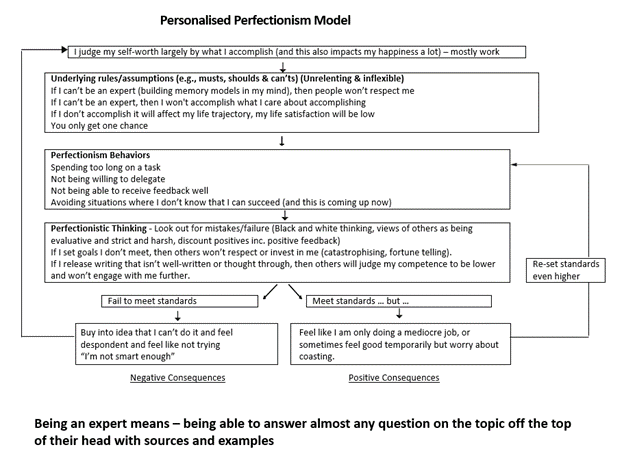
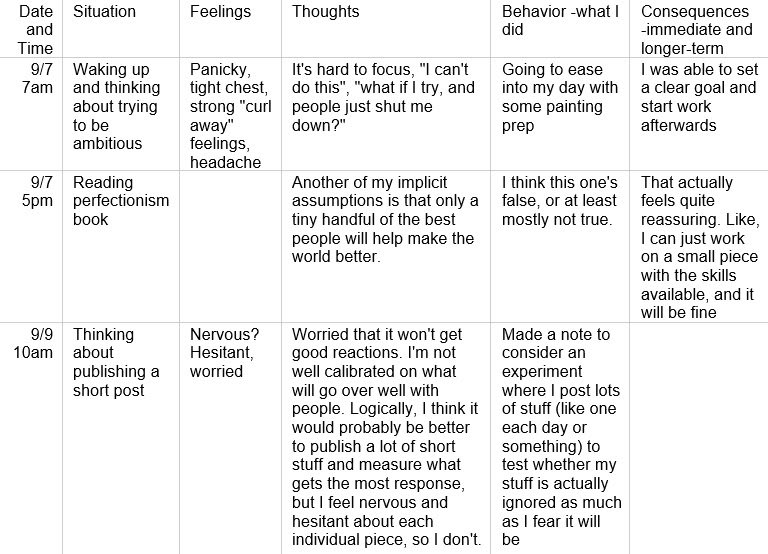
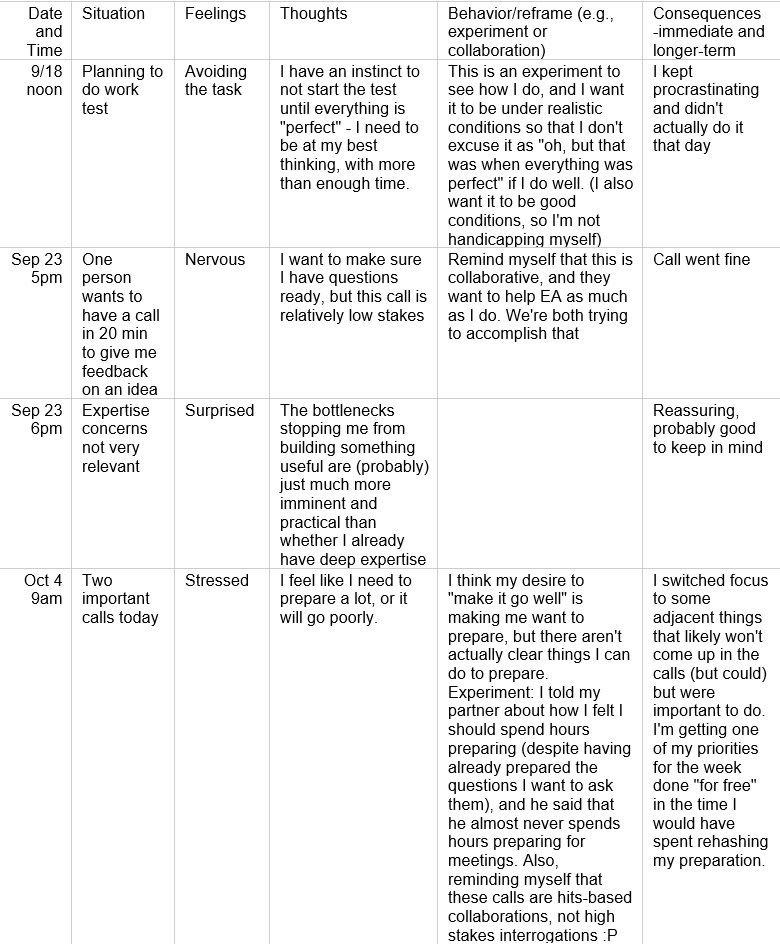
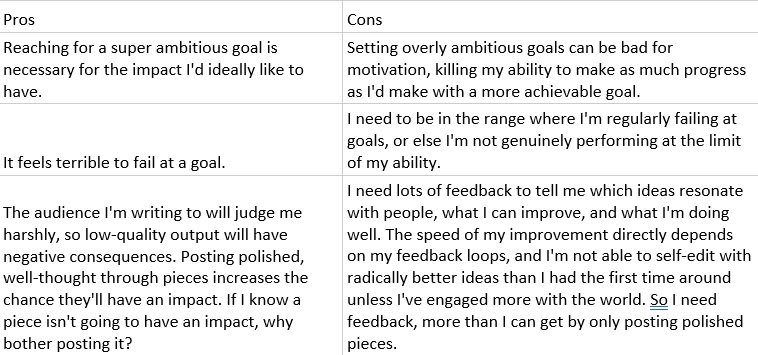
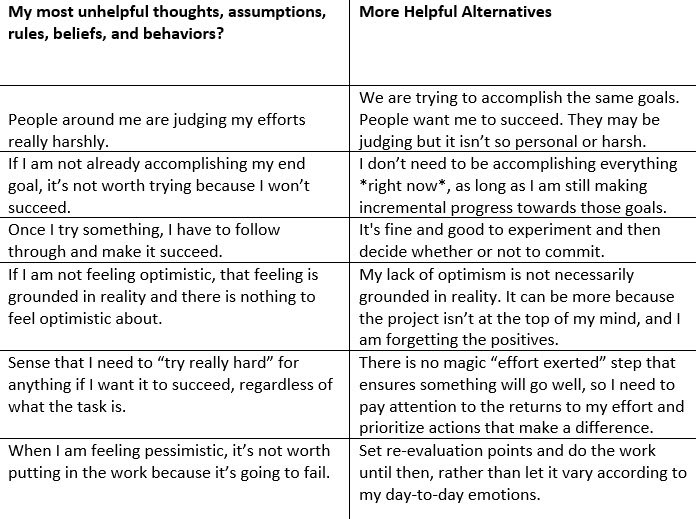
This is a perfect description of what happened when I tried to write a blog for a few years. I spent endless time worrying over minor wording choices when I could have been writing new content, sharing my content in more places, or doing any number of more productive things. I hadn't connected that failure to "perfectionism" before, but reading this post in 2016 would have been really beneficial to me.
Haha, same! My reaction to reading Luisa's post was "Ohh, wait, perfectionism is spending time inefficiently because I don't want to stopping working on one task until I think it's good?" Calling this "perfectionism" feels a bit misleading: from the inside it never felt like I was trying to make something perfect, just meeting an (admittedly high) bar for "good enough."
Thanks for sharing! This is exactly the kind of thing I'd love to see more of on the forum
You mentioned starting ADHD meds? I'd be very interested in reading about the process leading up to that, if you feel like sharing
Do you have a view on using LLMs as therapists as suggested here?
Re using LLMs as therapists, I'm more skeptical than Kat is, but not by much. Like, maybe LLMs can replace 20% or 50% of therapy right now, not 100%?
My best experiences with therapists were when they could hold threads over several sessions and challenge my blindspots. I expect it will be easier to ignore an LLM telling you something you don't want to hear, and the LLM probably won't be able to hold me accountable for doing my homework :P
On the other hand, free on-demand therapy! That's huge! If you've already done therapy before and more-or-less know what you want out of a session, then this seems like it could be a pretty good substitute for ongoing sessions.
Right now, I have a lot of uncertainty that I expect to narrow as I hear more examples of people using the LLMs for therapy.
I have a couple blog posts in the works on ADHD!